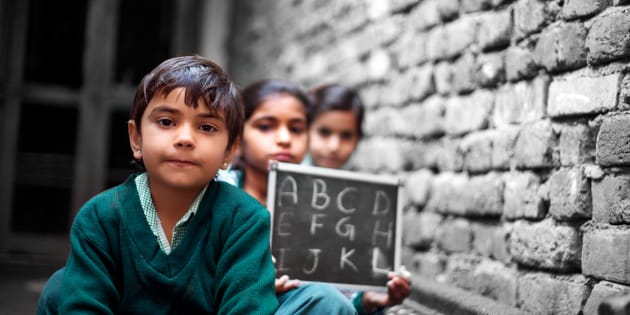Unless they get an education, there’ll be no end to the cycle of poverty.
“To do anything, you need education.” This is the cornerstone of my upbringing, the foundation of my own success, and the fuel that drives my goal of educating slum children. Since I was a mere child, my father had instilled in me a desire to learn and a value for education. Now I want to pass on these values to underprivileged children who had the misfortune of being born in the slums to parents who see no purpose in attending classes when they can earn a living for the family.
Brought up in a household that not only supports but encourages learning, I had the privilege of pursuing my engineering degree with ease. Although I had a somewhat smooth journey towards success and briefly worked for the Public Health Engineering Department, I veered towards a life in social service.
The spark that triggered this move was a trip to the US, during which I noticed that even the most underprivileged children there weren’t lacking in education. This gave them a fighting chance in the world. Even a child who was born in an immensely impoverished family can become something big—a lawyer, a business mogul, a successful author, or anything they want as long as they set their minds to it. That’s because they already have the most important tool—education.ARMAN ZHENIKEYEV – PROFESSIONAL PHOTOGRAPHER FROM KAZAKHSTAN
As anyone who lives in India would know, this isn’t the case with underprivileged children in our country. Children are born in the slums, they grow up in the slums, they marry and have children in the slums, and then they spend their last days in the slums. I realised then that we’re not making enough of an effort to equip our underprivileged children with the tools required to break their chains and the cycle of poverty.
This inspired me to start “Pratham Shiksha“, a school dedicated to providing better education to slum children. From a small classroom that began in my garage, the school has now become full-fledged with classes being provided till 8th grade.
The ripple effect of education
India has been struggling with high illiteracy rates for decades. And although the different initiatives undertaken by the government and various NGOs have made significant improvements, it’s not enough. Despite the opportunity to provide their kids with free education, free uniforms and free books, many slum parents still refuse to send their children to school.
The biggest reason is because they’d rather have them earn a little bit of money to feed the family now than have them educated for future employment opportunities. These slum parents see no purpose of education because they themselves “survived” without an education. But does this mean we should just stop trying to educate their children?
If we don’t make the effort, those children are just going to end up with the same misfortune and mindsets as their own parents.
What’s important to realise is that if we don’t make the effort, those children are just going to end up with the same misfortune and mindsets as their own parents. When they have children of their own, they’re going to instill the same values in them and fail to provide them with an education. So it’s a complete cycle of illiteracy, which results in:
- High poverty rates (because uneducated children grow up with low employment opportunities).
- Population growth (because uneducated children grow up without proper knowledge of family planning and birth control).
- High illiteracy rates (because uneducated children will grow up to be adults who don’t see the need to educate their own children).
In addition to these, there are plenty of other issues that result from lack of education. So to tackle all the big issues we’re facing in India, the best solution is to start with underprivileged children. We provide them with the tools to escape their present circumstances; we provide our country with a stepping stone for progress.
Changing the mindsets of parents
As mentioned earlier, many slum parents are of the mindset that their children don’t need an education. It would be a major challenge to change this mindset—an almost impossible task. So how do we help underprivileged children with this challenge blocking our way? I have devised a work-around in which our school has created flexible class schedules, offering a chance for these children to earn their livelihood and still attend their classes regularly.
In addition to this, we provide children with various vocational training classes where they learn basic skills such as plumbing, stitching and more. With tens of thousands of underprivileged children in India, it’s an uphill battle. But we’re getting there and we’re equipping them with the essential tools to make their own future. As of today, more than 3000 slum children have successfully completed their education through Pratham Shiksha.
Source: http://www.huffingtonpost.in/sumeeti-mittal/why-ive-made-it-my-mission-to-educate-slum-children_a_21659082/

